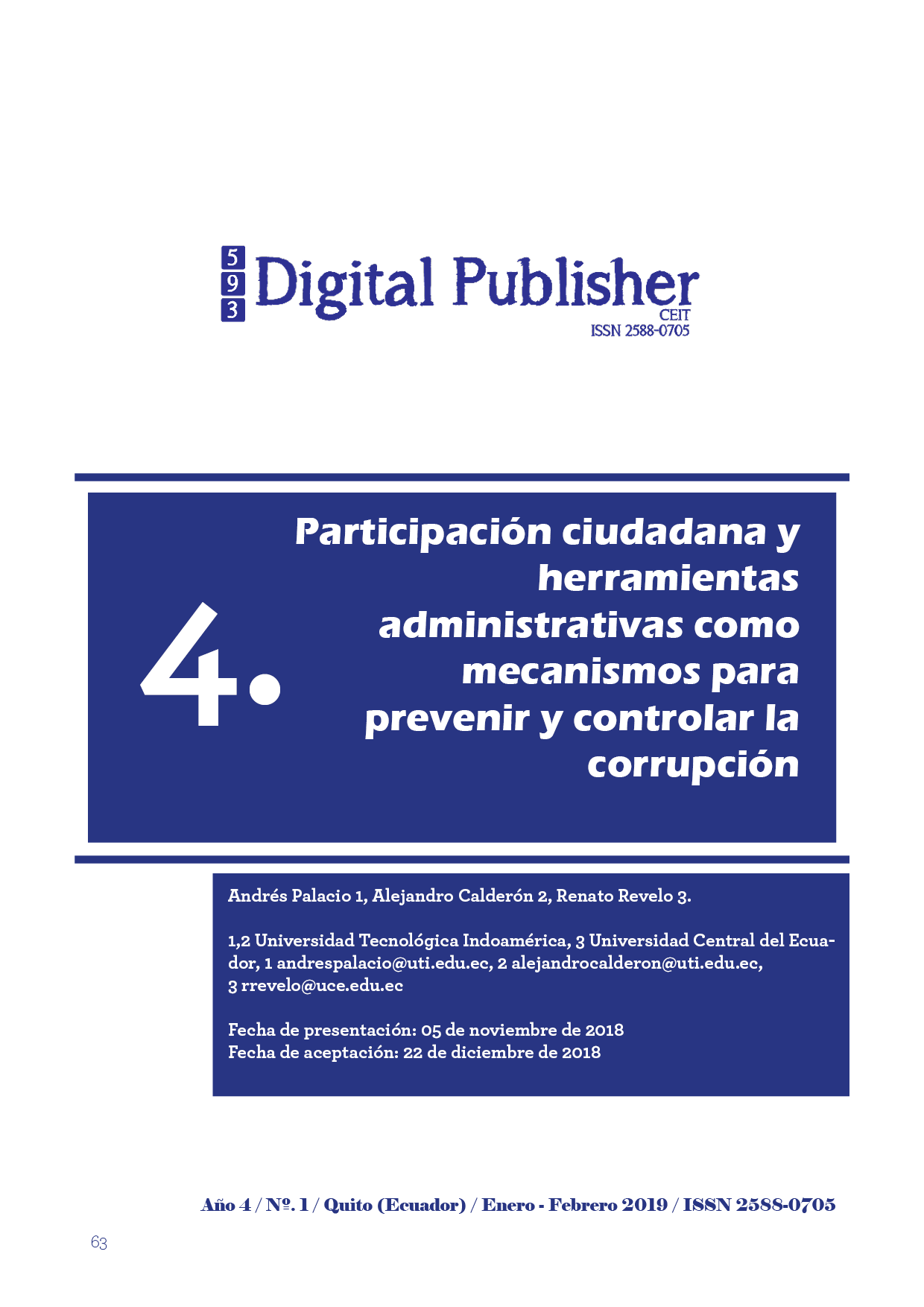Citizen participation and administrative tools as mechanisms to prevent and control corruption
Main Article Content
Abstract
Corruption is synonymous poverty and general delay for the society that contains it, being in these places where this public problem often operates from high levels, through authorities that hold political and / or economic power, a circumstance that is used by interest groups to create regulations that privilege their benefit to the detriment of the general interest. For this reason, the objective of this paper is to provide a proposal that does not only focus on institutional or regulatory changes to address this problem, because this issue persists despite administrative or legal reforms. In this sense, this work proposes an alternative that allows to anticipate and control corruption from its root. Method. The main source of the information will be documentary, through bibliographic collection instruments, being the "analysis" the procedure for the treatment of the collected information. Results The proposal is based on the formation of citizen commissions for transparency and anti-corruption, so that they are those that serve as support to control the corruption of the main institutions or state organisms, so that they are those who give support to control the corruption of the main institutions or state agencies. These commissions will operate under a method whose process has the following steps: diagnosis of a public institution, risk management, planning, articulation, internal communication, controls, management audit, measurement and improvement. Conclusion. The results and the proposal of this article are not definitive, but rather aim to open certain lines of discussion for future research and applications.
Downloads
Article Details
1. Derechos de autor
Las obras que se publican en 593 Digital Publisher CEIT están sujetas a los siguientes términos:
1.1. 593 Digital Publisher CEIT, conserva los derechos patrimoniales (copyright) de las obras publicadas, favorece y permite la reutilización de las mismas bajo la licencia Licencia Creative Commons 4.0 de Reconocimiento-NoComercial-CompartirIgual 4.0, por lo cual se pueden copiar, usar, difundir, transmitir y exponer públicamente, siempre que:
1.1.a. Se cite la autoría y fuente original de su publicación (revista, editorial, URL).
1.1.b. No se usen para fines comerciales u onerosos.
1.1.c. Se mencione la existencia y especificaciones de esta licencia de uso.
References
Asamblea Constituyente. (2008). Constitución de la República del Ecuador.
Asamblea Nacional. (2010). Ley Orgánica del Servicio Público .
Asamblea Nacional. (2017). Código Orgánico Administrativo .
Damania, R., Fredriksson, P. G., & Mani, M. (2004). The persistence of corruption and regulatory compliance failures: Theory and evidence. Public Choice, 121, 363-390.
Diario Las Américas. (18 de febrero de 2018). Los 10 mejores países de América Latina para emigrar. América Latina. Obtenido de https://www.diariolasamericas.com/america-latina/los-10-mejores-paises-america-latina-emigrar-n4115282
Fisman, R., & Gatti, R. (2002). Decentralization and corruption: Evidence from U.S. federal transfer programs. Public Choice, 113(1), 25-35.
Glaeser, E., & Saks, R. (2006). Corruption in America. Journal of Public Economics, 90(1), 1053-1072.
Hernández, J. (2018). La anticorrupción en Colombia, el agente encubierto y la función de inteligencia. Revista prolegómenos(21), 99-114.
Lommitz, L. (2003). Globalización, economía informal y redes sociales. Madrid: Culturas en contacto:encuentros y desencuentros.
Lozeau, A., Langley, A., & Denis, J. L. (2002). The corruption of Managerial Techniques by Organizations. Human Relations, 55(5), 537-564.
Luhmann, N. (1998). Complejidad y modernidad. Madrid: Trotta.
Moya, E., & Dueñas, G. (2015). Las relaciones sociales que posibilitan la corrupción en municipios: Un estudio de dos casos. Transparencia & Sociedad(3), 13-28.
Nutt, P., & Backoff, R. (1992). Strategic management of public and third sector organizations. San Francisco, CA: Jossey-Bass.
Osborne, D., & Gaebler, T. (1992). Reinventing government: How the entrepreneurial spirit is transforming the public sector. Reading, MA: Addison-Wesley.
Palacio-Fierro, A., Guadalupe-Lanas, J., Mantilla-Gárces, D., & Revelo-Oña, E. (2018). Utilización de controles, auditorías administrativas y sistemas de gestión de la calidad en las PYMES. CienciAmérica, 7(1), 84-97.
Svaleryd, H., & Vlachos, J. (2009). Political rents in a non-corrupt democracy. Journal of Public Economics, 95(3), 355-372.
Tella, R., & Fisman, R. (2004). Are politicians really paid like bureaucrats? Journal of Law and Economics, 47(2), 477-513.
Villoria, M. (2007). La corrupción en España. Cuadernos de derecho público(31), 109-134.
Wei, S.-J. (2001). La corrupción en el desarrollo económico: ¿lubricante beneficioso, molestia menor u obstáculo? Revista Gestión y Análisis de Políticas Públicas(21), 83-94.

